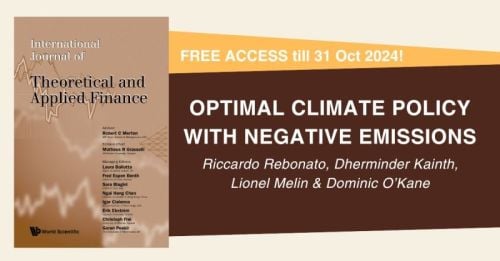
Research on Optimal Climate Policy with Negative Emissions Published in Leading Finance Journal
Written on 22 Aug 2024.

We are pleased to announce that a recent research paper authored by EDHEC Business School Professor Riccardo Rebonato, Scientific Director at EDHEC-Risk Climate Impact Institute, along with Research Directors Dherminder Kainth, Dominic O'Kane, and Associate Researcher Lionel Melin, has been featured in the Special Issue on the Impacts of Climate Change on Economics, Finance, and Insurance of the prestigious International Journal of Theoretical and Applied Finance.
In their paper, titled "Optimal Climate Policy with Negative Emissions," the authors utilize a modification of the DICE model to analyze the optimal policy responses to climate change, focusing on emissions abatement and CO2 removal. By calibrating the marginal costs of these interventions to the latest scientific data, they demonstrate that carbon removal plays a critical role in crafting an economically optimal climate policy. Their findings indicate that achieving the Paris Agreement’s target of limiting global warming to 1.5-2°C by 2100 is not only aspirational but also optimal when carbon removal is prioritized.
Key contributions of the research:
- Net-Negative Emissions: The study underscores the importance of targeting net-negative emissions rather than merely net-zero, emphasizing the necessity of active CO2 removal.
- Economic and Sectoral Shifts: The authors highlight the substantial economic and sectoral changes required to meet these climate targets, particularly the need for significant expansion in the carbon removal industry.
- Policy Considerations: The research also addresses the potential risk of moral hazard, warning that a slowdown in abatement efforts could undermine the necessary carbon removal initiatives. The authors advocate for maintaining current emission targets while simultaneously scaling up carbon removal strategies.
The full paper is available for free at this link until 31 October 2024.
Abstract:
We can limit the future temperature impact of climate change in two ways: (i) reducing our use of CO2 emitting fuels as an energy source (abatement), and (ii) using negative emission technologies (NETs) to remove existing CO2 from the atmosphere (removal). Using a modification of the DICE model, we analyze the optimal use of these two policy responses to climate change. After calibrating the marginal costs of abatement and CO2 removal to the latest scientific information, we find that carbon removal must play a very large role in an optimal policy. If this policy is followed, we find that the Paris-Agreement 1.5–2∘C warming by 2100 target is not just aspirational, but optimal. When an important role is played by NETs to control global warming, the decrease in carbon emissions can be more gradual, reducing transition risk and social dislocations. We examine the impact on the economy of large-scale carbon removal programs, the potential for moral hazard and the logistical problems associated with the storage of the removed carbon.
Keywords: Climate change, global warming, negative emissions technologies, integrated assessment models

